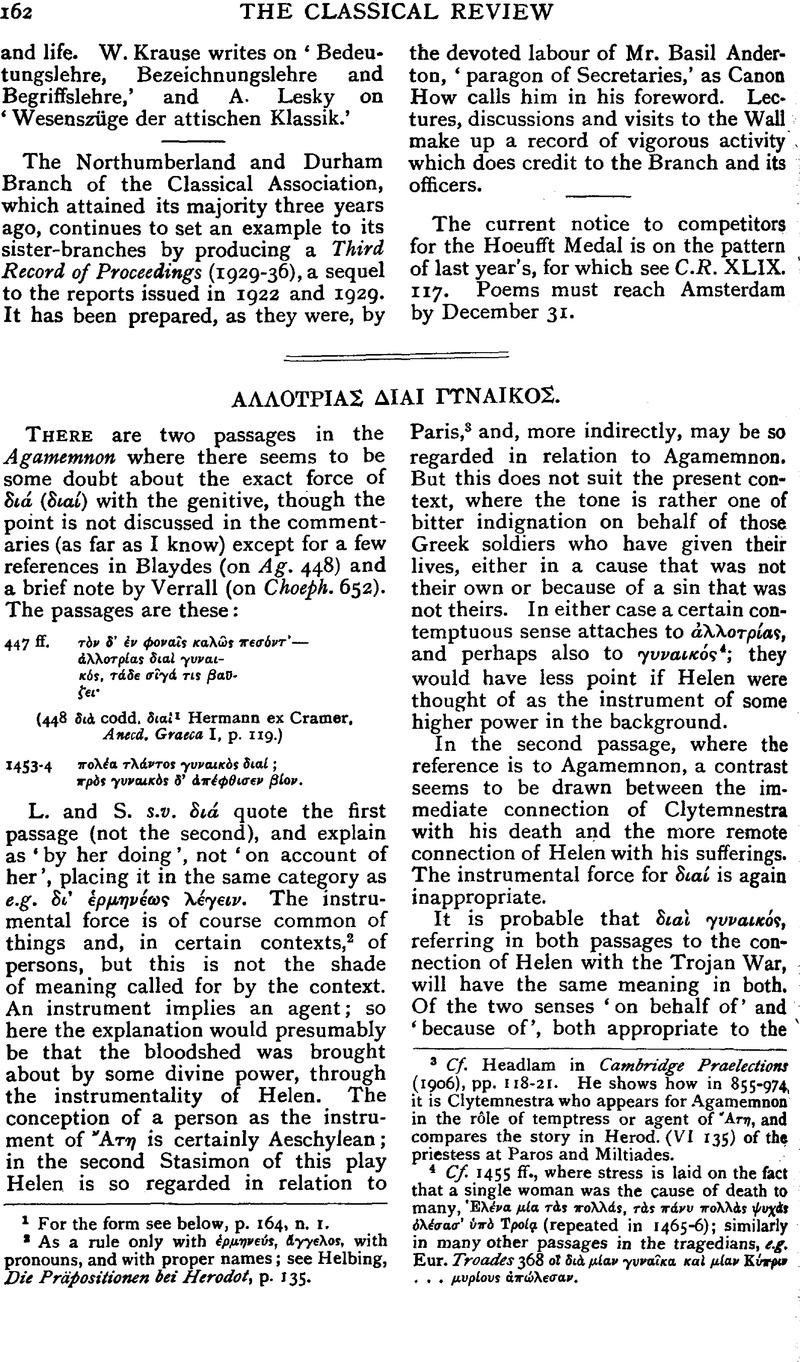No CrossRef data available.
Published online by Cambridge University Press: 27 October 2009

page 163 note 1 For the form see below, p. 164, n. 1.
page 162 note 2 As a rule only with ![]() , with pronouns, and with proper names; see Helbing, Die PräpositioTien bet Herodot, p. 135.
, with pronouns, and with proper names; see Helbing, Die PräpositioTien bet Herodot, p. 135.
page 162 note 3 Cf. Headlam, in Cambridge Praelections (1906), pp. 118–121Google Scholar. He shows how in 855–974, it is Clytemnestra who appears for Agamemnon in the role of temptress or agent of “Ατη, and compares the story in Herod. (VI 135) of the priestess at Paros and Miltiades.
page 162 note 4 Cf 1455 ff., where stress is laid on the fact that a single woman was the cause of death to many, ![]() (repeated in 1465–6); similarly in many other passages in the tragedians, e.g Eur. Troades 368
(repeated in 1465–6); similarly in many other passages in the tragedians, e.g Eur. Troades 368 ![]() .
.
page 163 note 1 Hartung actually conjectured χριν for δι in this passage.
page 163 note 2 In the Koine δι in the sense ‘for the sake of becomes common, and there are some examples of δι gen. in this sense, partly owing to the lack of feeling for the distinction between the uses of gen. and ace, and partly to the influence of the gen. with πρ etc. See Blass-Debrunner, Neutestamentliche Gramtnatik, § 222 ; E. Nachmanson, ‘ Syntaktische Inschriftenstudien’ Eranos IX, pp. 30–81, No. 6.
page 163 note 3 Kühner (484–5) does not notice this use of δι He refers to a very similar use, where δι is equivalent to a purpose clause, in four passages in Thuc, but IV 102 is probably a later adscript, and the same may be true of the others (cf. Rutherford, Thuc. IV p. xxxix).
page 163 note 4 For other passages in both classical and Christian literature where the conception of God as the cause of all things finds expression see Norden, Agnostos Theos, pp. 157, 240 ff., 347–8.
page 163 note 5 Conington defends the text, but takes δ ια in the sense ‘ in the hands of’.
page 164 note 1 δια apparently peculiar to Aeschylus, is no doubt formed on the analogy of παρα and κα ταand used as an archaic and poetical variant, mainly for metrical reasons. On the origin of the ending αι see Brugmann § 260.
page 164 note 2 The use of the gen. is perhaps due to the cause being regarded almost as an agent; cf.Laws 70IB 2 and Arist. De Part. An 641b 16 ![]() . Adam's emendation δι' ὅ (codd.δι' ο ὖ) in Rep. 562B 8 is justified, since the sense there required is ‘because of, i.e. ’for the sake of, and it is unlikely that P. would use δι c. gen. in this sense in a context where it might be wrongly interpreted as instrumental.
. Adam's emendation δι' ὅ (codd.δι' ο ὖ) in Rep. 562B 8 is justified, since the sense there required is ‘because of, i.e. ’for the sake of, and it is unlikely that P. would use δι c. gen. in this sense in a context where it might be wrongly interpreted as instrumental.
page 164 note 3 Eucken, , Ueber den Sprachgebrauch des Arist., p. 39; Krebs, Die Präpp. bei Polyb., p. 68.Google Scholar
page 164 note 4 In the post-classical period, when δι was normally used in the sense ‘ on behalf of’, there are some instances where, by analogy with δι the ace. is used with πρ in this sense. See Jannaris, Hist. Gr. Gr. § 1680.
page 164 note 5 I am indebted to Professor A. Cameron for several suggestions in connection with this article.